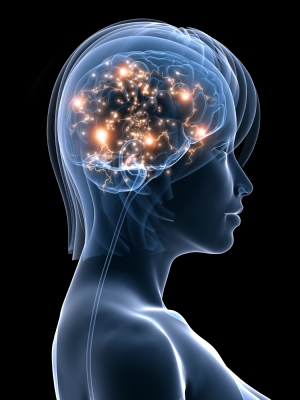Wednesday Bubble: your brain on soy
Aging and estrogen. Gotta love it. It can signify the loss of reproduction, skin elasticity, vaginal lubrication, bones and even parts of our brain, at least hypothetically. Yet, can ingesting soy help improve attention, focus, problem solving and memory? A newly published study in Neurology journal counters claims that it can, but adds further evidence that certain factors may influence benefits, such as reproductive age or if menopause comes on naturally or not.
A bit of context is needed. We know that soy isoflavones, primarily genistein, daidzein and glycitein have been suggested as an effective strategy for combating menopausal symptoms such as hot flashes or night sweats. The beneficial effects of soy are believed to be associated with the ability to soy isoflavones to attach themselves to estrogen receptors. Importantly, our brains contain certain estrogen receptors in hippocampus, which is responsible for consolidating both short and long-term memory and spatial navigation. Moreover, both genistein and daidzein have been shown to have a particular affinity for the very type of estrogen receptors that reside in the hippocampus, which is why researchers have been so interested in determining if ingesting soy can help combat the natural decline in memory and cognition. While findings have been mixed, some women appear to be better metabolizers of S-equol, which is related to daidzein, produced in the gut and targets estrogen receptors in beneficial ways that other soy isoflavones do not. If you click on the links posted above, you will find a wealth of information on soy and the research that has been done.
In this particular study, healthy, postmenopausal women received either 25 g daily of isoflavone-rich soy protein (more than 3/4 of which contained genistein and daidzein) or milk-protein daily; both were offered in the form of a powder or bar. Over the next two and half years, the participants visited the clinic at various intervals to participate in tests that measure their cognitive skills, including:
- Executive function (working memory, expression, general intelligence), and,
- Verbal learning, verbal memory and visual memory.
Although the women were not required to change anything about their diet, they were asked to refrain from taking soy supplements over the study course.
The findings? Researchers failed to observe any differences in cognitive function between women taking soy and women taking milk protein, even though scores did improve over the two+ year time period. Yet, they did note differences in improvements in visual memory scores, with women in the soy isoflavone group better able to recall faces both immediately and with a short delay compared to their milk protein peers. The group of younger, postmenopausal women in the study did not appear to have any advantages over the older women (note that age range was as broad as 49 to 94 years).
So, what to make of this? Is your brain on soy an improvement? Apparently, not really. What the researchers do say, however, is that surgical menopause may eventually cause a larger decline in cognitive function over time (these group of women actually showed a worsening in cognition regardless of whether or not they took soy). They also note that soybeans contain active constituents other than isoflavones (e.g. lignans) that may boost or detract from isoflavones effect on cognition.
Still, there is a wee bit of a silver lining. Although it’s true that if you are seeking a better functioning brain, you may wish to look elsewhere, a high soy diet can be consumed without fear of any adverse effects on memory skills that are associated with dementia in later life, and may possibly even improve them. The verdict is still out for women who are naturally high S-equol producers. In so far as hot flashes and night sweats? The evidence looks much better.
Estrogen’s a bitch, isn’t it? But who says that the bitch can’t be tamed or at least, kept at bay?!
Read More
Wednesday Bubble: This is your brain. This is your brain on phytoestrogens.
Do phytoestrogens improve cognitive performance?
This is the first I’ve heard that phytoestrogens, i.e. isoflavones, lignans (a major form of phytoestrogens found in flaxseed and sesame seeds) and coumestans (a type of phytoestrogen found in split peas, pinto beans and lima beans) may help boost attention, executive function and memory. Yet, similar to other alternative strategies, the studies examining these benefits have yielded mixed results. Moreover, a lot of these studies have been based on short-term and not long-term use of phytoestrogens, have failed to determine how these compounds may influence brain function, and have not looked specifically at women undergoing the menopausal transition, at least until now.
This time, researchers took a cohort of women actively involved in the Study of Women’s Health Across the Nation. All 1,677 women who saw the study through to its end were between the ages of 42 and 52, premenopausal, early or late perimenopausal, and naturally or surgically postmenopausal, and were not using hormones. Importantly, this group of women included several ethnic groups, which allowed the researchers to see if phytoestrogens behaved differently depending on ethnicity; they included white, African American, Hispanic, Chinese and Japanese.
- Diet was regularly evaluated and included interviews, open ended questions and specifically, daily intake of four types of isoflavones, four types of lignans and coumesterol, which is the main phytoestrogen in coumestans. In Asian women, soybeans, tofus and soy milk were the main sources of isoflavones while in non-Asian women, soy mik, tofu and meat substitutes (e.g. seitan) were the main sources. Regardless of ethnic group, coffee and tea were the primary sources of lignans, and bean sprouts, the main source of coumestans.
- Cognitive testing was done in the morning and always in the same language for bilingual women. These tests included processing speed, immediate and delayed recall and working memory.
- The study took place over 6 years and women were visited 10 times.
So, what did they learn?
First, phytoestrogens appear to affect cognitive function differently, depending on the type and stage of menopause. For example, Asian women whose diets had high levels of isoflavones tended to process information quicker but only during early perimenopause and postmenopause. Conversely, during the same time, these women had poor recall. Non-Asian women who ate a lot of isoflavones also had poor recall during perimenopause. Moreover, women who ate the most lignans, regardless of ethic group, appeared to have better memories but only during late perimenopause. Overall, coumestans did not appear to influence brain function whatsoever.
It’s all sort of confusing, isn’t it? What’s more, even the researchers admit that the effects, when seen, were quite small. And the distinctions between Asian and non-Asian women? It’s the chicken/egg paradigm: is it dose or DNA? At the end of the day, it’s all bubble burstable because scientists remain unclear as to how phytoestrogens affect the way we process information. It is possible that its due to their antioxidant characteristics, but who knows?
Meanwhile? Despite potential GI tract issues (e.g. gas, bloating, constipation), incorporating higher levels of phytoestrogens into your diet may be a good thing. Your brain on phytoestrogens? Who doesn’t need a little boost?
Read MoreDr. Seuss, omega-3s and brains!
I am not jumping on the Dr. Seuss bandwagon, I promise! But when I ran across this study on omega-3 fatty acids, the aging brain and memory, the following lines from Oh! The Places You’ll Go came to mind:
You have brains in your head. You have feet in your shoes. You can steer yourself any direction you choose. You’re on your own. And you know what you know. And YOU are the one who’ll decide where to go…” — Oh! The Places You’ll Go. Dr. Seuss
Damn our aging brains, right?! Coupled with waning hormones, daily stressors and even weight gain, and many women of ‘a certain age’ are left with a veritable mindless meld cognitive decline and memory issues that only seem to worsen over time. And there’s nothing that can be done.
Think again. Researchers say that low levels of omega-3 fatty acids may accelerate the rate at which our brains age and even cause lapses in thinking and memory. This latest bit of information comes from an analysis of from 1,575 women participating in the ongoing Framingham Study. Women in this portion of the study (who were, on average 67 years old) had their blood drawn and examined for concentrations of omega-3s in red blood cells, underwent brain MRI, and participated in battery of cognitive-psychological tests. The findings? Those with the lowest levels of docosahexaenoic acid (DHA) had lower brain volumes compared to women who had higher levels. According to one of the lead study investigators. Dr. Zaldy Tan, this distinction “is equivalent to about two years of structural brain aging.” Moreover, lower DHA and ecosapentoic acid (EHA) levels were also linked to declines in the ability to solve problems, multitask and think abstractly – all of which are tied to visual memory and so-called “executive function,” a concept that refers to the ability to connect past experiences with present action. Humans use executive function to plan, organize, strategize, focus and remember details and manage time.
These findings are critical because they add to a growing body of research that show that omega-3 fatty acids are essential for brain health, possibly due to their positive actions on blood vessels in the central nervous system. In fact, clogged arteries and stroke are associated higher risks of dementia and cognitive decline, so the benefits of omega-3s may relate to how they can help to lower blood pressure, reduce stroke risk, decrease inflammation and reduce blood fat levels. The ongoing question is always diet versus supplements. And while diet is sure to improve the body’s concentrations of omega-3s, it can be difficult to maintain the three times a week regimen.
Personally? I have gravitate towards Krill oil because it doesn’t cause the ‘burps’ and is environmentally friendly. But as a dietician friend recently pointed out to me, the levels of DHA in Krill oil are relatively low, meaning that if I want to slow down my aging brain, I may need to find sources of DHA to supplement what I’m already taking (e.g. from seaweed or coldwater fish).
Dr. Seuss made it abundantly clear that we have choices and it is those choices that will steer the direction we go. Want to save your brain? It looks as though the addition of omega-3s might help.
Read MoreWednesday Bubble: What did you forget? And why?
 If you are like me, you often get up, enter rooms and spend at least five minutes wandering aimlessly around trying to remember why you are there in the first place. And these memory challenges? They tend to worsen as we age and certainly as we move through menopause, not only do to hormones but largely to stress. However, researchers still haven’t completely discerned the ‘what’ from the ‘what’ when it comes to memory, although a current exploration of the topic in the Quarterly Journal of Experimental Psychology certainly lends an interesting perspective: doorways.
If you are like me, you often get up, enter rooms and spend at least five minutes wandering aimlessly around trying to remember why you are there in the first place. And these memory challenges? They tend to worsen as we age and certainly as we move through menopause, not only do to hormones but largely to stress. However, researchers still haven’t completely discerned the ‘what’ from the ‘what’ when it comes to memory, although a current exploration of the topic in the Quarterly Journal of Experimental Psychology certainly lends an interesting perspective: doorways.
Huh?
Yes, doorways, or more specifically, walking through them from one location to another, which according to a team of researchers at the University of Notre Dame, causes us to forget information. The reasons, although fairly complex, appear to be linked to a shift that occurs when one’s boundary or environment does; crossing the threshold causes the brain to go into overdrive to update understanding of ongoing events. So, as we analyze our new environment (i.e. the contents of another room), information that was present in our brains before we crossed the threshold is no longer so readily available.
In a series of three experiments, researchers teased out the ‘why’ of recall or lack thereof. In the first, 31 women were seated in front of a computer simulated game, in which they became totally immersed in moving objects from a table in one room to a table in the same room or in another. However, once they started moving on the screen, the object they were carrying became invisible. And when they were asked to repeatedly recall the objects that they were carrying immediately after entering the new location, recall apparently became slower and less accurate than the recall right after they moved the object across the room.
In a second task, 28 women and 32 men moved through a real world environment, where they chose and then carried covered physical objects from one room to another and then were asked to take a recognition test. Again, their memory appeared to worsen between the rooms rather than within them.
The researchers then conducted a third task, in which they discovered that context is not important and contrary to what many believe, we don’t encode information when we sit in a room, leave it and then return.
The upshot is that it appears that we keep information at hand until some sort of shift occurs and the brain needs to purge it to deal with new information. That shift is as simple as walking through a doorway and once it’s gone, it may be gone forever and irretrievable.
Do hormone shifts make this worse? Who knows? But, your daily memory loss appears to be only a doorway away.
p.s. Writers Charles Brenner and Jeffrey Zacks wrote a great piece about this study in Scientific American. Definitely check it out for more about this research.
Read More
And then the power died…what did I forget?
I was planning on writing a review of a new documentary about menopause when the power died. Mama Nature and her power surge obviously has other plans for me so I will leave you to an oldie but goodie. Look for Wednesday’s Bubble cause this doc is worth consideration.
And so, without further ado…
If you’re anything like me, you are starting to forget things. Things you need to do, why you walk into rooms, shopping lists, things you said, the whole nine yards. For me, it’s become the norm, not the exception and while I spend a lot of time making jokes about it, it also drives me crazy.
Yet, today’s Bubble is not one that I’m likely to forget. I’d like to think of it as one part inspiration and one part WTF? And it leaves me with a whole lot of questions to boot.
Study findings suggest that gaining weight during menopause may increase the risk for loss of gray matter. Gray matter refers to the cortex of the brain, which contains nerve cells. It is involved in muscle control, sensory perception (seeing/hearing), emotions, speech and finally, memory.
In this study, which was published in the online edition of the journal Psychosomatic Medicine, researchers evaluated brain imaging data, demographic information (height, weight) and behavioral measures (perceived psychiatric stress) obtained from 48 healthy postmenopausal women. Data were collected over a 20-year period.
The findings showed a unique association between increase in body weight during the transition from peri- to post-menopause (as measured by body mass index or BMI) and a 22% reduction in grey matter volume. These findings occurred in women who were otherwise healthy, had no history of heart disease or psychiatric illness and did not meet the threshold for obesity (>30 BMI). All women had also undergone natural menopause.
The researchers suggest that weight gain during menopause is a “highly modifiable risk factor” that may help to prevent or slow “potential alterations in brain function that are important to quality of life.”
I’ve written previous posts on cognitive issues during menopause, whether they be linked with life stressors, HRT or aging. Now it seems that researchers are telling us that weight gain may also be a risk factor.
Less clear is how much weight gain and what we should do about it. In general one solution to combating weight gain in midlife is restraint. Coupled with exercise, this may just be the magic formula. In the meantime, I think that we need a few more studies to take a closer look at brain matter changes in midlife.
What do you think?
I just forgot why I’m asking you that…!
Read MoreDoes your mental energy need a boost?
Mental energy. That elusive construct that is defined by our mood and feelings of fatigue or energy, our motivation, determination and enthusiasms and our ability to sustain focus and attention. I don’t know about you but I find that my mental energy is not always optimum. Moreover, I am not surprised; between physical, work and life demands, I am often overworked, overextended and overstressed. Personally, I find that downtime, exercise and creative endeavors help to refuel and refresh. However, can foods do the same?,
According to researcher Michael C. Falk from the Life Sciences Research Center in Bethesda, MD, part of the challenge in determining whether or not certain substances can enhance mental energy is the diverse number of methods used to measure effect. So, a lack of proof of the benefit of a particular substance might be partially related to the method. Nevertheless, in a recent study, he and his colleagues identified the most widely studied substances in diet and supplements: Ginko biloba, ginseng, glucose and omega-3 fatty acids and examined how they might be impacting the different facets of mental energy.
The findings:
Ginkgo biloba Ginko has been used in Traditional Chinese Medicine (TCM) for centuries, mostly for age-related declines in cognition, dementia and for Alzheimer’s. Unfortunately, it hasn’t shown much promise in this regard, but some data suggest that it might have use in improving mood, boosting how quickly individuals process information, and even improve attention. Less clear, however, how much should be taken and in what form (i.e. supplement or extract) or the length of time before results are seen.
Ginseng Like Ginkgo, ginseng is another herb that is common to TCM, either alone or in combination with others. An important challenge when using ginseng for medicinal purposes is that it quality is highly variable, which is why, similar to other herbs, you need to look for standardized formulations. When it comes to mental energy, the verdict is still out and research studies are inconclusive. The question remains, however, whether or not this is due to the fact that claims that it boosts mental prowess are false or that the actual ginseng being studied is too varied in quality and the part of the plant from which study formulations are derived are inconsistent.
Glucose Sugar. Not only is it an essential energy source for the body but it is the brain’s primary energy source. And yet, the studies that have looked at the effects of glucose on brain function, memory or even mood are all over the map and according to researchers, not very well documented. So before you start in on the next sugar buzz, you might want to find another boost for your mood, fatigue or focus.
Omega-3 fatty acids I love fish oils. Researchers continue to study them because their utility is so broad, although the source of omega-3, dosage and ratio of EPA and DHA appear to be important factors in terms of mood (i.e. depression in particular) and mental energy. Overuse of fish oils can also impair the ability of blood to clot and depress overall immune functioning. Still, out of the dietary components that researchers studied, omega-3’s were by far the one most backed by clear data. Most recently, they’ve also been shown to help prevent stroke. In so far as mental energy goes, the researchers note that evidence suggests that fish oils may help delay or reduce cognitive decline in the elderly or improve verbal fluency. Less clear is whether this benefit is stronger if the they are taken earlier in life before cognitive decline. And of course, there is litte agreement on whether or not fish oils supplements convey the same benefits as obtaining the through dietary sources.
The upshot is that the evidence is scattered, inconclusive and downright shoddy in some areas. And mental energy might need more than certain foods to reach its optimum level. Personally, I’m going to stick with my current program to maintain the mental mojo. But I’m open to suggestions. What about you? How are you dealing with the overworked, overextended and overstressed paradigm?
Read More










